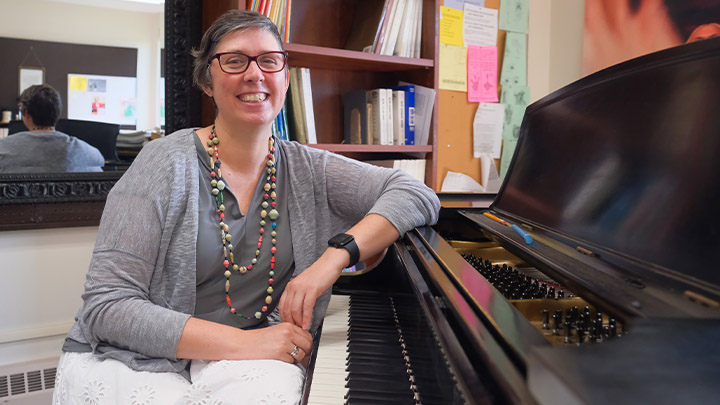Newly proposed legislation in the Pennsylvania General Assembly would provide a major boost for the more than 600 music therapists practicing in the state, something that Nicole Hahna, a Slippery Rock University associate professor of music, has been advocating for in recent years.
“We’ve been trying to create a music therapy license for music therapists in Pennsylvania,” said Hahna, co-chair of the Pennsylvania Music Therapy Task Force that was established by the Mid-Atlantic Region of the American Music Therapy Association. “The need has increased because most of the states around us have a license for music therapists and that creates more access to jobs and opportunities.”
Bipartisan legislation, Senate Bill 579, was recently introduced by State Sens. Elder Vogel, R-47th, and Carolyn Comitta, D-19th, that would establish a board certification exam, continuing education requirements, and a code of ethics for trained music therapists to receive professional licensure under the State Board of Social Workers, Marriage and Family Therapists, and Professional Counselors.
Music therapy continues to emerge as a vital intervention in a clinical setting to help people with mental health conditions, developmental and learning disabilities, neurological conditions, trauma and other medical needs. Music therapists treat a variety of clients, from those battling stress, anxiety and depression, to easing pain and improving communication and social skills in other clients. More than 600 music therapists are working in Pennsylvania, serving 50,000 residents each year.
Although Pennsylvania is not one of the 19 U.S. states with a licensure or certification program for music therapy, there are 10 colleges and universities in the state, including SRU, with AMTA-approved music therapy programs, the most in any state. There are fewer than 100 programs nationwide. That means neighboring states that have licensing systems like Ohio and Maryland are hiring professionals who are trained in Pennsylvania, leading trained music therapists to exit the state.
With a program that is nearly 50 years strong, SRU is a leader in educating music therapists in the region, including Michelle Muth, ’09, who operates a private practice, M3 Music Therapy, LLC, in Beaver County. According to Hahna, Muth was one of Vogel’s constituents who introduced the senator to music therapy, leading Vogel to champion the legislative efforts.
Muth previously served as co-chair of the Pennsylvania Music Therapy Task Force. Madison Frank, an adjunct professor at Immaculata University, is now co-chair along with Hahna.
In addition to a bachelor’s degree program that started in 1977, SRU started a master’s degree program in 2016 that was the first music therapy program in the country with emphases on multicultural, social justice, insight-oriented approaches and resource-oriented approaches. SRU is now one of five schools with music therapy master’s programs.
“As a professor, I like to think about the positive ripple effects and the clinical potential that we have as teachers,” said Hahna, who joined the SRU faculty in 2009. “It gives me such joy to be able to impact the health care field and profession by helping create students who are ready to collaborate with others. Interprofessional collaboration is a big part of my teaching philosophy, and I infuse that into my classes.”
Hahna appreciates working across departments and colleges to educate students, including programs at SRU like the College of Health Profession’s Interprofessional Education Event, where students can learn how best to work together with professionals in multiple disciplines to provide better care for patients.
“We’re teaching what music therapy is within the context of a treatment team as a whole,” Hahna said. “So when our students are actually on a treatment team, they’re ready to go. They understand what social work is, because they worked side by side with the social worker.”
Hahna appreciates the opportunities she’s had at SRU to apply her service to advocate for her profession on the Pennsylvania Music Therapy Task Force, as well as her scholarship, which included research that she did with her students at UPMC Magee-Womens Hospital in Pittsburgh in its outpatient cancer center.
“I love those parts of what I do but it’s teaching that gets to be at the center,” Hahna said. “What keeps me here is the culture and the students. It’s a great place to work.”
More information about the Pennsylvania Music Therapy Task Force is available at pamusictherapy.org. More information about music therapy programs at SRU is available on the program’s webpage.






